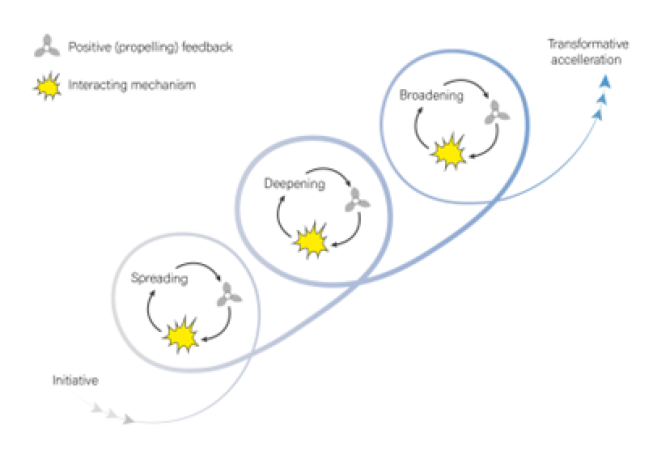
Project
Flagship Connected Circularity – Changing Together (PhD project – Olga Schagen)
As part of the larger Connected Circularity program of the WUR this research project has its focus on developing concrete pathways for the creation of a bio-based circular economy. The bio-based economy converts biomass from land and sea into food, fuels, chemicals and materials. Principles of a circular economy involve: replacing -of- towards renewable energy; elimination of waste; zero emissions; redesign of materials, products and systems (Ellen MacArthur Foundation 2012).
Background
To ensure a sustainable future it is crucial to move towards a bio-based economy based on a circular instead of a linear use of resources. This entails a fundamental change in technological, organisational, behavioural, market and institutional practices (IPCC 2012; Grashof-Bokdam et al. 2018). For this reason the research takes place in an interdisciplinary and transdisciplinary co-creation and co-learning setting in which different research groups within Wageningen University take part. The involved groups are Public Administration and Policy (PAP), Animal Production Systems (APS), Plant Research (WPSR), Livestock Research (WASG), Environmental Research (WENR), Marine Research, Economic Research (WECR) and Food Bio-based Research (WFBR).
Description
Because of the systemic and non-linear nature of the transition towards a circular bio-economy an alternative governance approach is required. The small wins governance framework (Termeer et al. 2017, Termeer & Metze, 2019) will be used to further explore these pathways to enhance change. In this framework, small wins are defined as concrete, completed, in-depth changes (Weick, 1984). Small wins include technological innovations, innovative regulations, new collaborative networks or innovative business models. The set-up of the research is first the analysis of case studies within the different domains from the perspective of this framework to identify small wins and failures. These small wins and failures will form the basis for learning through intervention and experimentation to signal out possible mechanisms that are at play in accelerating a transformation towards a circular bio-economy. We define this acceleration as the deepening, broadening and spreading of initiatives.
By achieving concrete results within deepening, broadening and spreading initiatives adjust themselves and amplify their impact. Deepening refers to initiatives becoming more circular and offering better solutions, broadening inclines the connecting of different agenda’s and sectors and spreading entails growing and becoming more numerous.
Results
‘’We studied eight mechanisms in relation to deepening, broadening and spreading. The interplay between learning by doing, professionalization and partnering seems crucial for developing. Specifically, learning by doing seems quintessential for deepening, partnering for broadening and professionalization for spreading. The mechanism of stabilizing provides the foundation for an initiative’s further development in deepening, broadening or spreading. The mechanisms of embedding and replicating are involved in integrating and spreading an initiative’s approach, knowledge and practices. We found that the initiatives can development in a transformative way through the continuous (re)activation of energizing and logic of attraction by spreading, deepening and broadening, and preserving these developments’’ (Schagen et al., 2022).
